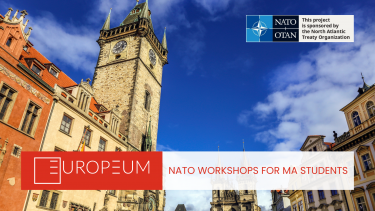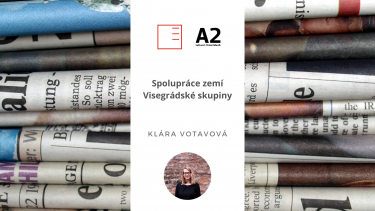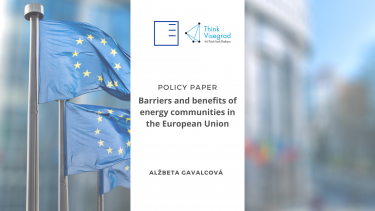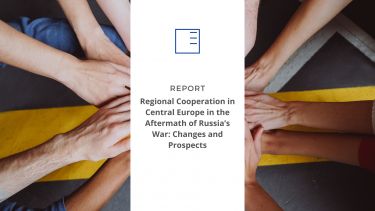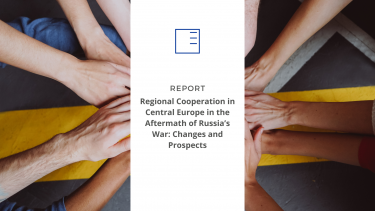Call for Participants: Euro-Atlantic Future of Ukraine and Eastern Europe: Views from Visegrad
Are you a Master’s student from the Czech Republic, Hungary, Poland, Slovakia keen on international relations and NATO's strategic future? Join our workshop series to engage with experts, present your views on NATO’s Open-Door policy, and network with peers from the region.
Zjistit více
NATO workshopy pro magisterské studenty: Euroatlantická budoucnost Ukrajiny a východní Evropy: Názory z Visegrádu
Jste studentem magisterského studia z České republiky, Maďarska, Polska nebo Slovenska a zajímáte se o mezinárodní vztahy a strategickou budoucnost NATO? Zapojte se do naší série seminářů, na kterých můžete diskutovat s odborníky, poděli se o své názory na politiku otevřených dveří NATO a navázat kontakty s vrstevníky z regionu.
Zjistit více
A2 | Cooperation of the Visegrad Group
Cooperation inside the Visegrad Group depends on the political situation of each country. In recent years, the alliance has drawn attention to itself with its criticism of the southern European states and anti-immigrant rhetoric. Klára Votavová, a researcher at EUROPEUM Institute, wrote her commentary for the biweekly A2.
Zjistit víceA2 | Spolupráce zemí Visegrádské skupiny
Spolupráce zemí Visegrádské skupiny závisí na politické situaci jednotlivých států. V posledních letech na sebe aliance upozornila kritikou států jižní Evropy a antimigrantskou rétorikou. Svůj komentář pro deník A2 sepsala Klára Votavová, výzkumná pracovnice Institutu EUROPEUM.
Zjistit vícePolicy Paper | Barriers and benefits of energy communities in the European Union
Energy communities are an effective means to decentralize and renew our energy systems with sustainable solutions as they are usually based on renewable energy. They have already started emerging in 1970´s, yet there has been a significant increase in their development only in recent years, also in terms of their introduction into the EU legislation. Especially in Western and Northern European countries the concept already enjoys vast popularity. On the other hand, in Central and Eastern European countries (further referred to as CEE) energy communities are only beginning to emerge. The policy brief (based on literature and interviews with various stakeholders ) examines the benefits energy communities may bring, and more importantly, the main obstacles remaining in their way for greater evolution in the CEE region – and especially Visegrad countries (V4). As these initiatives progress, sharing the best practices will ensure the success of the community energy in the energy transition. Writes Alžbeta Gavalcová.
Zjistit vícePolicy Paper | Barriers and benefits of energy communities in the European Union
Energetické komunity jsou účinným prostředkem decentralizace a obnovy našich energetických systémů pomocí udržitelných řešení, protože jsou obvykle založeny na obnovitelné energii. Začaly se objevovat již v 70. letech 20. století, avšak k jejich výraznému rozvoji došlo až v posledních letech, a to i z hlediska jejich zavedení do legislativy EU. Zejména v zemích západní a severní Evropy se tato koncepce již těší velké oblibě. Naproti tomu v zemích střední a východní Evropy (dále jen SVE) se energetická společenství teprve začínají vytvářet. Tento politický brief (založený na literatuře a rozhovorech s různými zúčastněnými stranami ) zkoumá výhody, které mohou energetická společenství přinést, a především hlavní překážky, které jim stále stojí v cestě k většímu rozvoji v regionu střední a východní Evropy - a zejména v zemích Visegrádské skupiny (V4). Jak tyto iniciativy postupují, sdílení osvědčených postupů zajistí úspěch komunitní energetiky v energetickém přechodu. Píše Alžbeta Gavalcová.
Zjistit víceReport | Regional Cooperation in Central Europe in the Aftermath of Russia’s War: Changes and Prospects
On April 18th, EUROPEUM’s Brussels Office in partnership with PISM Brussels Office under the Think Visegrad platform hosted a discussion titled “Regional Cooperation in Central Europe in the Aftermath of Russia’s War: Changes and Prospects”. This event was attended by 15 experts from think tanks and representatives of EU institutions.
Zjistit víceReport | Regional Cooperation in Central Europe in the Aftermath of Russia’s War: Changes and Prospects
Dne 18. dubna 2024 uspořádala bruselská kancelář Institutu EUROPEUM ve spolupráci s bruselskou kanceláří Polského institutu mezinárodních vztahů (PISM) v rámci platformy Think Visegrad diskusi s názvem "Regionální spolupráce ve střední Evropě po válce s Ruskem: změny a vyhlídky". Této akce se zúčastnilo 15 odborníků z think tanků a zástupců institucí EU.
Zjistit víceThink Visegrad Fellowship offer: Call for proposals 2024
The Think Visegrad platform, which brings together think tanks from the Visegrad countries, including the EUROPEUM Institute for European Policy, is offering eight visiting fellowships to non-Visegrad expert fellows for the period Summer/Autumn/Winter of 2024. The duration of fellowships varies from 6 to 8 weeks (based on agreement with the hosting institute).
Zjistit víceThink Visegrad Fellowship offer: Call for proposals 2024
The Think Visegrad platform, which brings together think tanks from the Visegrad countries, including the EUROPEUM Institute for European Policy, is offering eight visiting fellowships to non-Visegrad expert fellows for the period Summer/Autumn/Winter of 2024. The duration of fellowships varies from 6 to 8 weeks (based on agreement with the hosting institute).
Zjistit víceStaroměstské náměstí 4/1
Praha 1 - Staré Město
110 00
tel.: +420 212 246 552
email: europeum@europeum.org
https://www.europeum.org
